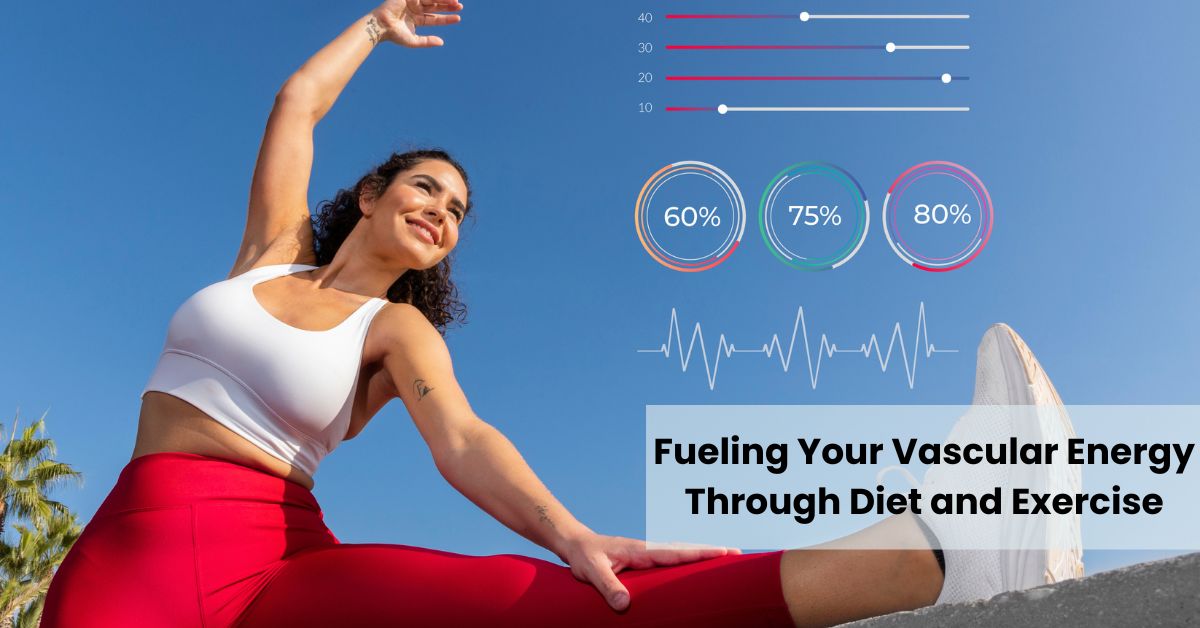Fueling Your Vascular Energy Through Diet and Exercise
Introduction:
Vascular health, encompassing the well-being of blood vessels throughout the body, is vital for overall wellness and longevity. While genetics play a role, lifestyle factors such as diet and exercise significantly impact vascular health. Here, intricate relationship between diet, exercise, and vascular health, exploring the mechanisms, benefits, and practical strategies for optimizing vascular function.
Understanding Vascular Health:
Before delving into the influence of diet and exercise, it’s essential to grasp the fundamentals of vascular health. The vascular system comprises arteries, veins, and capillaries responsible for transporting blood and nutrients throughout the body. Healthy blood vessels are flexible, resilient, and free from plaque buildup or inflammation. Conversely, compromised vascular health can lead to conditions like atherosclerosis, hypertension, and peripheral artery disease, increasing the risk of heart attack, stroke, and other cardiovascular events.
The Impact of Diet on Vascular Health:
Diet plays a pivotal role in vascular health, influencing factors such as blood pressure, cholesterol levels, inflammation, and oxidative stress. A diet rich in fruits, vegetables, whole grains, lean proteins, and healthy fats provides essential nutrients, antioxidants, and fiber that support vascular function. Conversely, diets high in processed foods, saturated fats, trans fats, sodium, and refined sugars can contribute to arterial stiffness, endothelial dysfunction, and plaque formation, predisposing individuals to vascular diseases.
Key Dietary Recommendations for Vascular Health:
- Embrace a plant-based diet: Incorporate plenty of fruits, vegetables, legumes, nuts, and seeds, which are rich in vitamins, minerals, and phytonutrients with anti-inflammatory and antioxidant properties.
- Choose healthy fats: Get the sources of unsaturated fats such as olive oil, avocado, fatty fish, and nuts, while limiting saturated and trans fats found in red meat, butter, and processed foods.
- Reduce sodium intake: Limit consumption of high-sodium foods like processed snacks, canned soups, and fast food, as excess sodium can elevate blood pressure and strain blood vessels.
- Control portion sizes: Practice mindful eating and portion control to maintain a healthy weight and prevent overconsumption of calories, which can contribute to obesity and metabolic syndrome.
- Stay hydrated: Drink an adequate amount of water daily to support blood volume and circulation, while minimizing sugary beverages and excessive caffeine intake.
Exercise and Vascular Health:
Regular physical activity is another cornerstone of vascular health, exerting beneficial effects on blood pressure, cholesterol levels, blood sugar regulation, and overall cardiovascular fitness. Exercise promotes vasodilation, enhances endothelial function, and stimulates the release of endorphins and nitric oxide, all of which contribute to improved vascular function and reduced risk of vascular diseases.
Types of Exercise for Vascular Health:
- Aerobic exercise: Activities such as brisk walking, jogging, cycling, swimming, and dancing increase heart rate and promote circulation, improving cardiovascular endurance and lowering blood pressure.
- Strength training: Incorporating resistance exercises using weights, resistance bands, or body weight helps build muscle mass, enhance metabolism, and support weight management, which are crucial for vascular health.
- Flexibility and balance exercises: Practices like yoga, Pilates, and tai chi improve flexibility, balance, and posture, reducing the risk of falls and injuries that can impact vascular health.
Creating a Balanced Approach:
Achieving optimal vascular health requires a holistic approach that combines healthy eating habits with regular physical activity. By adopting a balanced lifestyle, individuals can synergistically enhance the benefits of diet and exercise on vascular function, thereby reducing the risk of cardiovascular diseases and promoting overall well-being.
Practical Tips for Incorporating Diet and Exercise into Daily Life:
- Plan meals ahead: Prepare nutritious meals and snacks in advance to avoid relying on convenience foods or unhealthy options when pressed for time.
- Find enjoyable activities: Choose exercises and physical activities that you enjoy, making it easier to stay motivated and consistent with your fitness routine.
- Set realistic goals: Establish achievable goals for dietary changes and exercise habits, gradually progressing towards more ambitious targets to sustain long-term improvements in vascular health.
- Seek professional guidance: Consult with Vascular Specialist In Coimbatore, for personal trainers for personalized recommendations and support in developing a tailored diet and exercise plan.
Conclusion:
Diet and exercise are powerful tools for optimizing vascular health and reducing the risk of cardiovascular diseases. By adopting a wholesome diet rich in nutrients and antioxidants, along with engaging in regular physical activity, individuals can support the health and resilience of their blood vessels, promoting longevity and vitality. Embrace the journey towards vascular wellness, one step and one bite at a time, for a healthier and happier life.


